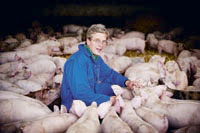2010 FW Awards: Pig Farmer of the Year finalist Roderic Bruce

Security and sustainability are two words that sum up Scottish pig producer Roderic Bruce’s business.
In his own words, “There’s no point being a great pig producer when you haven’t got a market.”
Operating a 350-sow indoor breeding and finishing herd in Udny, Aberdeenshire, Roderic is taking every step possible to ensure his business is profitable. A drive for efficiency, lowered production costs and improved competitiveness are resulting in a net profit of 33p/kg.
And a large part of the drive for a profitable business stems from his involvement with industry groups including Scottish Pig Producers and the Pig Benchmarking Group, which Roderic believes is the key to survival. “Critical mass is important so information and ideas can be shared,” he says. And being SAC Pig Monitor Farm for Scotland is the best mode for transmitting ideas. “For three years my accounts are entirely open for people to see. However, the small details being learnt are really paying off.”
Although only in the first year as a monitor farm, things are already changing at Logierieve. Four cameras have been installed above feeders on flat deck in each room. They capture images of pigs and assess weight – with a verified accuracy of 98%.
“Initial trials highlighted a post-weaning dip in performance and, as a result of this, we have undertaken trials focusing on maximising early feed and water intake post-weaning,” explains Roderic.
He has also installed environmental dataloggers (Barn Report) in pig buildings to monitor temperature, ventilation, energy and water use. “The aim is to optimise the environment for pig growth while minimising energy use. By changing the ventilation pattern alone we have made a saving of 50p a pig from lowered electricity costs.”
Costs are also kept as low as possible by feeding cereals and oilseed rape grown on 200ha (494 acres) and home mixed. Roderic has recently bought an additional 250ha (618 acres), making him almost self-sufficient in feed. “We are also going to think about growing peas and beans in light of sustained high soya prices,” he adds.
However, there are some areas of the farm Roderic is aware are not efficient. “Although weaners and finisher rooms are fully slatted and dry sows loose-housed on straw, the grower accommodation is either straw-based yards or older, Danish-type buildings. These are not only labour intensive, but we have more health problems there,” he says.
For this reason Roderic has ploughed £550,000 into a programme to replace three pig buildings and upgrade the feed mill. “The new buildings will remove the growing stage on straw, allowing pigs to be kept from weaning to 40kg and 40kg to slaughter. Farrowing accommodation will also be upgraded. I believe I can provide a high-welfare system on slats,” he comments.
And, because the ultimate top line is from pigs through the door, Roderic is also considering installing a wet-feeding system. “Feed conversion rate (FCR) is important and, while part of that is in the genetics which are currently PIC, adopting a criss-cross serving pattern, a wet feed will also help lower FCR and hopefully time to slaughter.”
A firm grasp is kept on performance, putting Roderic among the top 15% of producers in the UK. His three-year key performance indicators include 25.4 pigs a sow, 2.36 litters a sow a year, a daily liveweight gain of 736kg, FCR of 2.5 and an average weight of 113.1kg. “As a result of setting targets and benchmarking, we have consistently achieved more than 2t deadweight of pigmeat produced a sow over the past three years. Roderic has also recently adopted QBox technology which uses electronic slaughter data to monitor output. “This has allowed more pigs to be marketed at the right weight to maximise grading and financial return. We have also purchased an electronic batch weigher to monitor weights.”
Pigs are marketed through Scottish Pig Producers to supply Asda. “This means pigs can be slaughtered locally at Broxburn, so we are only paying 4p/kg for haulage instead of 8p/kg if we had to transport further afield. A rolling annual contract with Asda based on a premium over DAPP gives me the confidence to invest.”
Farm Facts
•350 sows
•Secure Asda contract
•Net profit 33p/kg
What the judges liked
• Nearly 100% Sustainable
• £550,000 reinvestment
• Large industry driving force
• For more on the 2010 Farmers Weekly Awards
• For more on the 2010 finalists

